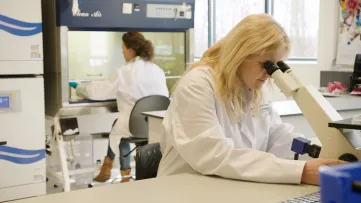Wageningen Bioveterinary Research

Wageningen Bioveterinary Research (WBVR) is a leading institute in the field of animal health and veterinary public health. Our core activities are applied scientific research and veterinary diagnostics.
Our location
Wageningen Bioveterinary Research is located in Lelystad, the Netherlands. Our site houses modern laboratories, high-containment facilities, and specialised animal housing designed to ensure biosafety and scientific excellence.
For contact and more, go to:
About Wageningen Bioveterinary Research
We contribute to a society in which animals and humans coexist healthily. We connect animal, human and environmental health through the diagnosis, surveillance, and control of zoonotic diseases. From avian influenza to Q fever, our scientists develop solutions that protect both animal and public health.
As the National Reference Laboratory (NRL) for numerous notifiable diseases, WBVR performs confirmatory diagnostics and quality assurance for the Dutch government. Every year, we conduct over 250,000 analyses to detect and monitor infectious diseases in livestock, wildlife, and aquatic species.
Our research combines fundamental knowledge with practical applications. We develop and validate diagnostic tests, assess vaccine efficacy, and design innovative strategies for disease prevention. Our innovative research supports evidence-based policies and contributes to resilient, sustainable livestock farming systems.
Our mission is to contribute to welfare and prosperity by improving animal and human health. To achieve this, we study prevention and control of infectious diseases through cutting-edge veterinary and biomedical research. Taking an interdisciplinary approach, we develop innovative and practical solutions for complex challenges in animal and public health.
Our experts specialise in pathogens, host responses, bioinformatics, pathology, epidemiology and diagnostics. As the National Reference Laboratory (NRL) for the Netherlands, we play a vital role in identifying and monitoring notifiable animal diseases, from livestock to fish, shellfish and wildlife.
Areas of expertise
WBVR brings together specialists in virology, bacteriology, pathology, immunology, epidemiology and vector-borne diseases. Multidisciplinary teams combine diagnostics, statutory tasks and innovative research to improve animal and public health.
Diagnostics
Our diagnostics and crisis organisation performs over 250,000 analyses annually, ensuring rapid and reliable pathogen detection across animal species. Through applied research, we translate laboratory findings into effective prevention and control strategies.
Contract research
WBVR also conducts contract research for governments and private partners, including vaccine evaluation, disinfectant testing and preclinical or clinical studies in high-containment facilities. This enables us to bridge the gap between scientific discovery and practical disease control.
WBVR operates under a robust quality management system that ensures reliability, transparency and international recognition.
- ISO 9001: General quality management certification for all organisational processes.
- ISO 17025(scope L389): Accreditation for specific diagnostic tests, guaranteeing analytical quality and traceability.
- ISO 17043 (scope R021): Accreditation for proficiency testing and interlaboratory ring trials.
- AAALAC accreditation: Full certification for laboratory animal care exceeding national legal standards for welfare and biosafety.
These accreditations confirm that WBVR’s research and diagnostics meet the highest international standards, providing assurance to clients, partners and authorities worldwide.
WBVR works closely with national and international partners to advance animal and public health. In the Netherlands, we collaborate with the Netherlands Food and Consumer Product Safety Authority (NVWA) and the Ministry of Agriculture, Nature and Food Quality on statutory research and reference diagnostics. Furthermore, our institute represents Wageningen University & Research in the Netherlands Centre of One Health (NCOH) a collaboration between the Dutch universities active in the field of One Health.
Internationally, WBVR is active in the networks of the World Organisation for Animal Health (WOAH), the European Food Safety Authority (EFSA) and the Food and Agriculture Organization (FAO) of the United Nations.
We also contribute to European Union Reference Laboratories (EURLs) and research infrastructures such as VetBioNet, strengthening Europe’s preparedness for emerging diseases.
These collaborations allow us to exchange expertise, align diagnostic standards, and enable rapid responses to animal health crises.
WBVR’s origins date back to 1904, when the National Serum Institute (RSI) was founded in Rotterdam to combat infectious animal diseases. Over time, it merged with other national veterinary research institutes to become today’s Wageningen Bioveterinary Research.
Milestones include the development of the DIVA principle (Differentiating Infected from Vaccinated Animals), isolation of the PRRSV Lelystad virus and the creation of innovative vaccines and diagnostic tools.
For more than a century, WBVR has contributed to eradicating major animal diseases in the Netherlands and Europe, remaining a cornerstone in veterinary science and One Health research.
View this longread: 120 years of experience in veterinary research
Our research is conducted in state-of-the-art laboratories and animal facilities that meet the highest biosafety standards.
The High Containment Unit (HCU) combines human biosafety level 3 (BSL-3) and veterinary biosafety level 4 (BSL-4) standards, allowing safe research on highly contagious pathogens such as foot-and-mouth disease, African swine fever and avian influenza.
Additional facilities include diagnostic laboratories and arthropod containment labs (ACL-3), as well as flexible animal housing for multiple species. Together, these facilities provide a unique infrastructure for multidisciplinary infectious disease research.
We always strive to provide you with the best possible service and to maintain the highest quality standards. If you have any questions, suggestions, comments or complaints, we would like to hear from you. We aim to respond to your query as quickly as possible, and we take every suggestion, comment or complaint seriously.
Email
You can submit your question, suggestion, comment or complaint by email.
Post
Or send it to:
Wageningen Bioveterinary Research
Department of QESH
Houtribweg 39
8221 RA Lelystad
The Netherlands
Follow Wageningen Bioveterinary Research on social media
Stay up-to-date and learn more about our research through our social channels.
